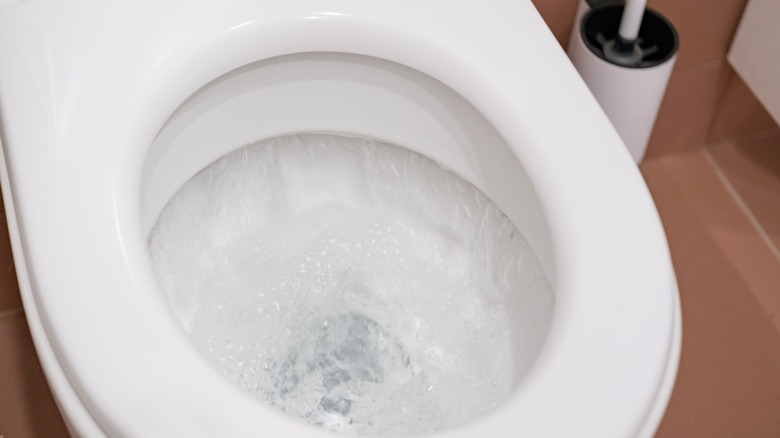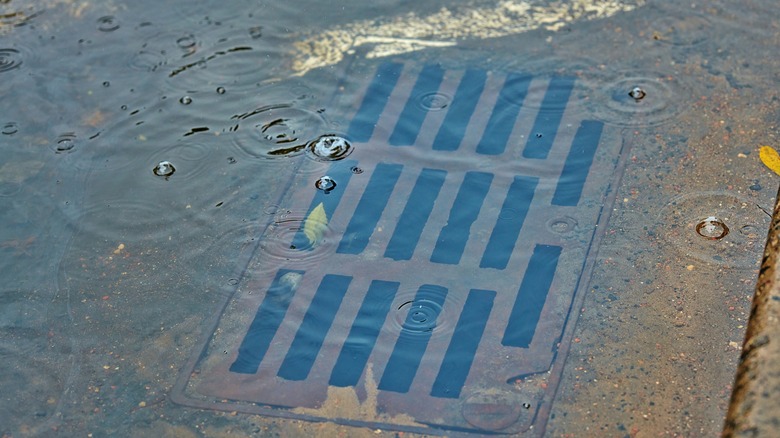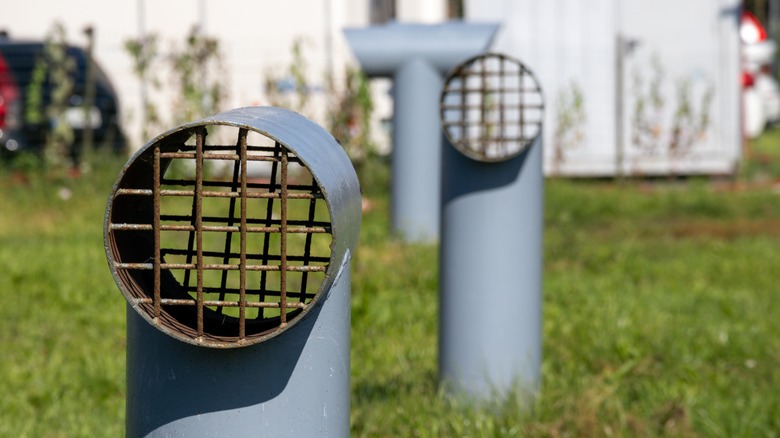This Is What Is Causing Your Toilet To Gurgle After A Heavy Rain
Have you noticed recently that your toilet makes gurgling sounds any time there's a heavy downpour of rain? You may wonder how rainwater affects your toilet (under normal conditions, it shouldn't) and dismiss the sounds as mere coincidence. Don't. The most likely root cause behind the strange sounds your toilet is producing is indeed the rainwater, and this signifies a serious issue in your sanitary system.
Rainwater entering the sanitary system can send air and gasses back up through the toilet, and the underlying problem may be affecting the entire neighborhood, not just your home. This is really bad news, as it means that the sanitary system is not only obstructed somewhere, but is in desperate need of repair. If you use a septic system, rainwater can cause similar issues, and also cause the toilet to gurgle. Below, we explain how rainwater gets into the sewage lines, why it prevents them from draining properly, and why your noisy toilet is the first (relatively minor) symptom in a potentially dangerous scenario.
A closer look at how rainwater causes issues with the sanitary system
Of all the situations that may cause your toilet to make a gurgling sound when it's raining, a blocked sewer line is the most common. The blockage may not be obvious under normal conditions, but as excess rainwater floods the system, the obstruction will disrupt the pipe's capacity to carry the water. When this happens, the excess water pressure sends any air trapped in the sanitary pipes back up the system and this escaping air is what's causing the toilet to gurgle.
Now, if you're at all familiar with how storm and sanitary drains work, you'll rightly ask: But aren't toilets connected to sanitary lines instead of storm sewers? Indeed, they are. The waste-filled water leaving a toilet should end up in the sanitary sewer, which then takes it to a municipal treatment facility — it should not go to the storm drain. Conversely, rainwater has no business accumulating in sanitary pipes. So what's causing this crossover between storm and sanitary drains?
This phenomenon is called "inflow and infiltration." Age-related wear and tear, tree roots, and poor maintenance practices, as well as improperly made DIY plumbing connections, all degrade the quality of the storm drainage systems. The resulting damage allows rainwater to enter and overwhelm the sewer drain system. Your gurgling toilet is just one symptom of this occurrence, but things can get worse if the stormwater causes sanitary pipes to overflow and contaminate the surrounding environment. Maintaining sanitary systems properly is the only way to prevent these issues.
Other issues that may cause the toilet to gurgle
It's possible that the gurgling noise you hear isn't caused by a poorly-maintained sanitary system that's letting in rainwater. In some cases, the noise may be caused by a blocked vent in your home. These vents are designed to release air that gets trapped in the sanitary system, and are usually located on the roof of the house. Debris like leaves or bird feathers can clog these vents and prevent air in the sanitary system from escaping. The air finds another way to leave the network and comes up through the toilet. If the bathtub and sinks also gurgle, or you notice that the drains smell like sewage, there's a chance that the vent is blocked. Get a professional to inspect the vent, especially if it's located on the roof.
If your home has a septic system, instead of relying on a municipal sanitary connection, an oversaturated drain field (also known as a "leach field") may be the root cause of the toilet gurgling noise. The leach field absorbs waste from the septic system. If rainwater fills it to the point where it can't accept waste from the septic tank, the pressure in the septic system will build until the gasses in it travel back up the toilet and cause it to gurgle. If you suspect that the leach field is oversaturated, get it professionally inspected. You may have to invest in a quality stormwater drainage solution around your home and in the leach field.


